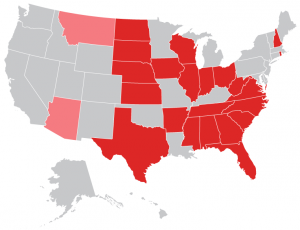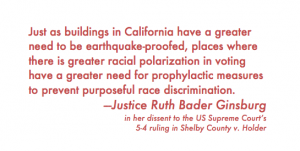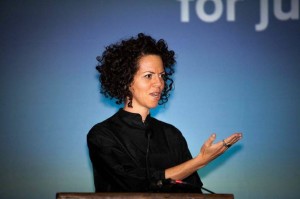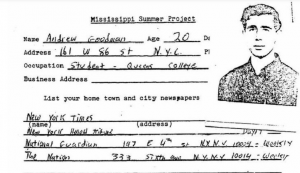Standing Up for Voting Rights: Jewish Voices (Still) Needed
This article kicks off a Zeek series published in honor of the 50-year anniversary of Freedom Summer and those who continue the fight today for justice.
The right to cast a vote is deeply cherished.
That’s one thing I learned 10 years ago when I went door-to-door, trying to engage heartbroken seniors in Florida who felt they had been cheated of their rights in previous elections. And that’s one reason I was enraged by last year’s Supreme Court ruling on Shelby County v. Holder. That 5-4 decision gutted the enforcement mechanisms in the Voting Rights Act, one of our most powerful tools for fighting voter suppression and discrimination at the polls. For the first time in nearly 50 years, thanks to this ruling, states and localities have been able to make drastic changes to undermine voting rights without federal restraint. And make changes they have, with a resurgence of action at the local level intended to keep vulnerable communities from casting votes.
Within hours of the ruling, the Texas state legislature rushed to pass a controversial voter ID bill that could disenfranchise thousands of voters. The Supreme Court ruling puts old-school tricks for suppressing the vote back on the table, like allowing a county board of elections to reassign polling places without telling voters. Earlier this year, the Miami-Dade County Elections Department — which saw horrendous, hours-long lines in the last election — announced it would close bathrooms at polling places, forcing people out of line before they could cast their ballots. Why would you do that, unless you just really, really wanted to take away someone’s right to vote?
In 2014 alone, 15 states introduced legislation to restrict voters’ access to the ballot through a mix of reductions to early voting, voter roll purges, and new, onerous registration requirements, and they are still at it. These and similar state and local efforts show just how harmful the dismantling of Voting Rights Act protections has already been. Does it matter? Well, Texas’s new restrictions could mean up to 800,000 legally registered voters are turned away at the polls. Republican Texas Governor Rick Perry beat his Democratic challenger Bill White by only 631,086 votes in 2010. So yes. It matters.
The Push for Change: Looking Forward
So there’s a fight to be had, and we need activists to fight it. I feel privileged to be a part of a re-energized Civil Rights Movement. I’m excited at its energy, and hopeful at its direction. But we will need a lot more of everyone — including Jews — if we’re going to build the power we need to fix these problems and pass a new federal law to protect voters on the state and local levels.
The bipartisan Voting Rights Amendment Act of 2014 would help overcome some of the damage done by Shelby County v. Holder. By modernizing and strengthening the Voting Rights Act, citizens would once again be able to turn to the federal courts to block discriminatory voting changes and make states and counties that are repeat offenders seek federal approval before they change voting procedures. On June 25, the Senate Judiciary Committee will at long last hold a hearing on this legislation. A large coalition of civic groups and faith groups is working to send a message that day and the days before and after. A message that makes it clear that we will not be ignored and are not going away. You can be part of that, too.
Jews and Voting Rights: Looking Back
The story of American Jews and the vote is already a long, long, long one. But let me see if I can hit some high points:
Scene One was a hundred years ago, when women’s fight for the vote was in full swing. Like many American Jews, that’s the era my family first arrived here, fleeing pogroms in Kiev. While synagogues and Jewish storefronts burned in Eastern Europe, my relatives were putting down roots in the country where “all men are created equal.” But Jewish women like Mary Belle Grossman in Ohio, Gertrude Weil in California and Belle Weinstein in Wisconsin thought that wasn’t enough, they thought it should be all men and all women, too. They endured public mockery and were called “militants” because they dared stand up for women’s suffrage.
Scene Two was 50 years later — when the fight for the vote turned explicitly to race. African-American citizens who tried to claim their rights risked injury or murder. And so volunteers from across the country flooded the state of Mississippi for Freedom Summer, registering black voters, setting up freedom schools for black children and shining a national spotlight on the reality of racism here in America. Among those who bravely joined the cause were two young American Jews, Andrew Goodman and Mickey Schwerner. They paid with their lives, killed by the Ku Klux Klan alongside James Chaney, a Mississippi-born African-American 21-year-old. Their bodies were found under a dam on August 4, 1964. The Voting Rights Act of 1965 was signed August 6 of the following year.
Scene Three was just 10 years ago, and it’s a memory of my own. I joined scores of other young motivated American Jews to help get out the vote in Palm Beach as part of “Operation Bubbe” — a concerted effort by this generation of American Jews to turn out Jewish senior citizens to the polls across Florida. This was 2004, the first presidential election after Bush v. Gore, when an imprecise and confusing ballot left thousands of seniors unsure who they have voted for, and the legal machinations that followed left none of us sure who had really won. Door after door, we encouraged seniors and other residents to vote, arranging rides to the polls and trying to overcome the cynicism that their vote wouldn’t matter. As a community of Jews, our outreach that weekend in Florida felt like more than just canvassing. It was an expression of our Jewish values — the core idea that we are connected, we are responsible for one another, and we have a responsibility to shape our society into what we want it to be.
In all three cases these movements have risen up against what is a sadly simple strategy. An elite group is in power, or is seeking more power. Their policies are not popular, because they are designed to benefit the elite and not the public. Rather than make the case for their policies, or change them, this elite group instead changes the rules of democracy itself. They restrict the vote to the elite who would benefit from their policies and to those who identify with them.
In short, the story of America is a long story of people in power trying to rig the system so they can stay in power. And Jews, no strangers to oppression, have always been part of the fight against that. We’ve been part of these struggles throughout history and in America we’ve had an impact. We’ve stood for justice.
Wanted: Your Voice for Voting Rights
So now we have to be there again.
It’s been less than a year since Shelby County v. Holder, and in that time it’s become more than clear that new restrictions on voting are more than just partisan gamesmanship. They are an affront to our core values. They say that some people’s voices are more desirable than others, that certain communities need to be silenced to keep order in society. That’s a scary road, as Jews well know. It also flies in the face of the Jewish idea that we are all connected, that our fates are bound up in one another.
Where some politicians are trying to suppress the electorate, America’s Jewish community is coming together, as the suffragettes did a hundred years ago, and students did 50 years ago, and as young Jewish activists did 10 years ago, to act on our common values. Thousands of Jewish voters and faith leaders are speaking up in support of the Voting Rights Amendment Act, urging Congress to get a move on and pass the VRAA. Earlier this year, dozens of rabbis from across the nation brought the message of voting rights straight to their congregations with sermons on the importance of this fight.
You don’t need to be a Jew to stand up for voting rights, any more than you need to be an African-American, a Latino, a senior citizen, a disabled person, or any of the other types of people who are being disenfranchised across the nation. You can be anyone who believes in justice and what’s right. But just as you can be anyone who stands up for justice, we all understand that it can be anyone who falls when justice is absent. When democracy is threatened for one of us, it is threatened for all of us. That’s why the core of democracy is the same as the core of Jewish faith — community.
Our whole community is at stake here. This is a fight we can’t afford to lose.
Three Things You Can Do
1) Sign our petition to restore the Voting Rights Act at www.soallcanvote.org.
2) Take part in our national day of action on June 24 by joining vigils in DC, Oakland, Denver and Jackson, MS.
3) Find out how you can participate and follow all the action on June 24 (more will be announced soon).
Stosh Cotler is the CEO of Bend the Arc: A Jewish Partnership for Justice.
![[the current issue of ZEEK]](../../image/2/100/0/5/uploads/leftistethicistgraphic-52842c6a.png)
- 5000 Pages of Zeek
- Founded in 2001, Zeek was the first Jewish online magazine, and we have over 5000 pages online to prove it, all available free of charge. Read more in the Archive.
More articles in





